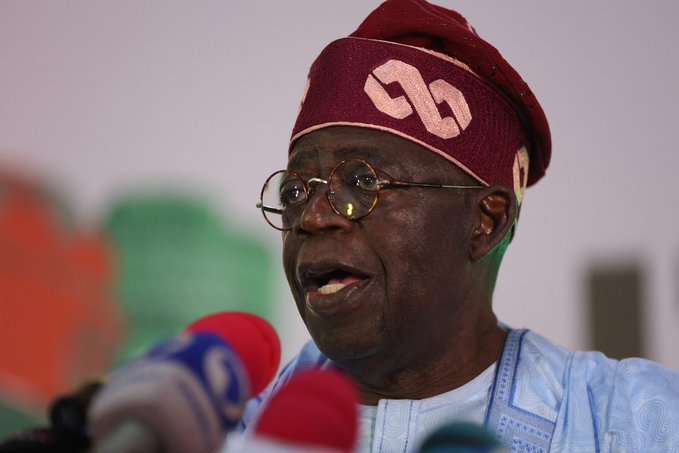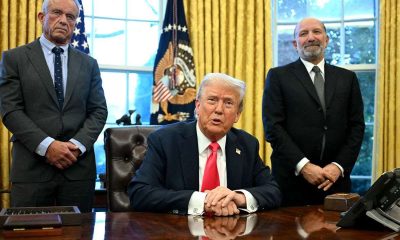Business
Exchange rate unification creates more problems for naira, economy

The President Bola Tinubu administration is counting heavily on the banking sector for the ambitious plan to drive a $1trn economy, with an ongoing recapitalisation underscoring the imperative for banks to fortify their financial positions.
Although major reforms of the administration to this end are creating avenues for the lenders to seamlessly bolster their balance sheets, negative impacts of the same policies on the real sector of the economy pose serious threat to the much desired growth.
Rising Interest rates
On Tuesday, the Monetary Policy Committee (MPC), of the Central Bank of Nigeria (CBN) for the fifth time this year voted to increase the monetary policy rate (MPR), which measures the benchmark interest rate, to 27.25 per cent, an increase of 50 basis points from 26.75 per cent announced in July 2024.
The new rate reflects an 8.5 per cent increase in interest rates under the current government, which took office a year ago and continues the spate of interest rate hikes going as far back as May 2022, when the hawkish monetary policy actions began.
However, the MPC retained the asymmetric corridor around the MPR at +500 to -100 basis points and raised the Cash Reserve Ratio of deposit money banks by 500 basis points to 50 per cent and merchant banks by 200 basis points to 16 per cent from 14 per cent and retained the liquidity ratio at 30 per cent.
Combined effect of removal of petrol and electricity subsidies as well as liberalization of foreign exchange market, and resultant devaluation of the naira, had compounded continued inflationary conditions in the economy, prompting sustained policy tightening, according to authorities.
By maintaining the monetary tightening regime despite marginal decline in inflation in July and August, the apex bank may have sparked further hikes in the cost of borrowing from the banks.
While this may further boost the fortunes of the banks by way of rising net interest income, analysts worry that it may also trigger manufacturers’, especially SMEs’, inability to service their loans, owing to shrinking profitability arising from high operating costs.
Gains for banks
Checks by Business Hallmark showed that interest rate hike implemented by the CBN in an attempt to combat rising inflation raised the combined net interest incomes of eight Deposit Money Banks (DMBs) by 163.19 per cent to N4.79tn for the first half of 2024.
The figure represents a surge from the N1.82tn recorded in the same period last year, according to an analysis of their financial reports ending June 2024.
Analysis of their latest financial statements revealed that the top-tier performance of leading financial institutions like Zenith, Access, Guaranty Trust Holding Company, Stanbic IBTC, First Bank, Sterling, Wema Bank, and First City Monument Bank (FCMB) highlights their ability to benefit from higher lending rates and strategic expansion of interest-generating assets.
Devaluation
Similarly, Nigeria’s leading commercial banks recorded significant forex revaluation gains, estimated at a combined total of N3.37 trillion in 2023 and Q1 2024, according to the analysis of their financial results filed with the Nigerian Exchange Limited (NGX). The forex gains earned are a result of the massive devaluation of the naira, which followed the unification of the exchange rate markets.
Findings showed that the banks, which include Access Holdings, FCMB, Fidelity, GTCO, Stanbic IBTC, UBA, and Zenith Bank, earned as much as N2.4 trillion in 2023 and other N883 billion in the first quarter of 2024.
Meanwhile, this prompted the Federal Government to impose 50 percent one-off forex tax on the banks, which comes to about N614.9 billion from nine banks on the windfall tax from their foreign currency revaluation gains for the financial period, December 2023.
The Senate had passed an amendment bill of the 2023 Finance Act, raising the windfall levy on banks’ foreign exchange revaluation gains from 50 percent as proposed by the President Tinubu to 70 percent.
Possible losses
However, while the financial sector reaps significant profits, manufacturing companies and other major sub-sectors of the economy faced severe challenges. The cost of imported raw materials and equipment surged due to the weaker naira, squeezing profit margins and escalating production costs. Also importers of goods were heavily hit as the cost of clearing, such as used cars, escalated. For instance, import duty on a used Toyota Camry rose from about N800,000 to over N2 million, making it unaffordable to average Nigerians.
The National President of the Association of Small Business Owners of Nigeria, Dr. Femi Egbesola, reacting to the latest MPR hike said, “This definitely will push up further the cost of doing business and, ultimately, the cost of goods and services. The manufacturing sector may contract more as fund liquidity and profitability will surely reduce.
“The banks or financial institutions may witness more bad debts as many borrowers may find it difficult to live up to their loan obligations. This will result in banks being averse to lending to the real sector.”
The Centre for the Promotion of Private Enterprise (CPPE), said the MPC’s decision to raise the MPR to 27.25 per cent was damaging to investment and economic growth.
Founder of CPPE, Dr. Muda Yusuf, in a statement sent to our correspondent said, “The implications of the latest MPC decision for investors are quite concerning as cost of funds would be further exacerbated, possibly well above 35 per cent or more.”
Yusuf argued that the increase in CRR to 50 per cent would “constrain financial intermediation with negative consequences for the banking system and the economy.”
However, Professor of Capital Markets, Uche Uwaleke, believes members of the MPC decided to ease threats in the exchange rate and inflation in the country.
“My take on the recent hike in MPR is that in matters like this, the CBN usually has information that may not be at the disposal of the public. I want to believe the members of MPC mean well for the economy and have decided to further tighten monetary policy based on strong evidence of major threats to exchange rate and inflation,” he said. The CBN had last week raised concern over the huge drop in the value of the naira from N1570 at the beginning of the week to over N1750, which coincided with the distribution of FAAC to the three tiers of government. The apex bank said that governors were using state and local government allocations to invade the forex market further putting pressure on the naira.
Beyond recapitalisation
After almost two decades of a major overhaul, the nation’s banking sector is once again witnessing a season of redoubled efforts by banks to meet the deadline of a recapitalisation exercise aimed at strengthening the financial system and supporting the country’s economic growth aspirations.
The CBN had in March 2024 directed a 10-fold increase in minimum capital requirements for all Nigerian banks by April 2026, in response to evolving economic dynamics. This left banks with international, national and regional authorisations with N500bn, N200bn and N50bn respectively as minimum capital requirements. According to CBN, the banks needed to be stronger and more stable to be able to drive the $1tn economy projected by President Bola Tinubu.
In what was widely seen as calling regulatory integrity to question, the CBN recently doled out a whooping N700 billion to facilitate the merger of a struggling Unity Bank Plc with Providus Bank Limited, two months after revoking the operating licence of Heritage Bank Limited in June 2024, for no worse reasons.
However, the Group Managing Director of Afrinvest, Ike Chioke, believes that while the recapitalisation exercise would enhance the capacity of banks to serve the larger economy, increase lending capacity, attract foreign investments, and promote better risk management, the banking sector alone cannot drive economic growth.
“To achieve a $1trn economy, Nigeria needs to grow beyond the banking sector. Every aspect of the economy must grow alongside it,” he cautioned.
Debt sustainability
Nigeria’s debt-to-GDP ratio recently crossed the 50 per cent threshold for the first time since 1991, raising the question of debt sustainability in a country that has allocated 30 per cent of the 2024 budget to debt servicing. During the last administration, the debate was whether a debt-revenue, or debt- GDP problem. While experts cautioned that country was having debt-revenue problem, government, typified by the former finance minister, Mrs. Zainab Ahmed, insisted government was fine with Debt-GDP ratio, which allowed for more borrowing.
The current administration inherited a debt-to-GDP ratio of 38 per cent. But fresh borrowings, securitisation of the N21 trillion Ways and Means advances, a failure to tackle fiscal challenges, such as low crude output amid soaring government expenditure, and a sluggish GDP growth rate have pushed the ratio to 52.9 per cent.
This, analysts say, is significantly above the prudential debt ceiling of 40 per cent prescribed by the International Monetary Fund (IMF), for developing countries.
Latest figures by the Debt Management Office (DMO), show a public debt portfolio of N121 trillion comprising a domestic debt of N65.6 trillion and a foreign debt portfolio of $42.1 billion or N56 trillion.
There are concerns that the rising debt-to-GDP ratio is bound to severely constrain the nation’s ability to expand the borrowing needed to fund the budget deficit. Nigeria spent N7.8 trillion to service its debt obligations in 2023, a 121 per cent increase compared to N3.52 trillion in the previous year.
A PwC report projected that Nigeria’s debt service could rise from N8.25 trillion in 2024 to N9.3 trillion in 2025, and N11.1 trillion in 2026. This, the report noted, may affect the country’s debt servicing ability, credit rating outlook, and borrowing cost.












